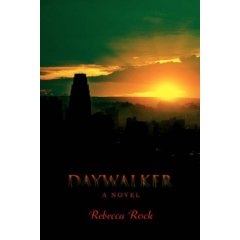 There’s no escaping the fact that vampires are a hot topic, and the recent success of the Twilight series has triggered a flood of new material featuring these sullen, fanged protagonists.
There’s no escaping the fact that vampires are a hot topic, and the recent success of the Twilight series has triggered a flood of new material featuring these sullen, fanged protagonists.
Virginia author Rebecca Rock has entered the fray with Daywalker, a novel about Jesse, a half-vampire raised by humans after the death of his parents. Now grown up, Jesse lives a double life – one part as a temperamental engineering student who lives with a pack of werewolves, and the other as a member of an elite psychic military team headed by his foster father.
Daywalker is something of an anomaly among vampire stories, in that vampirism itself never really has a major impact on the plot. Jesse needs to keep his mixed heritage hidden from all but a select few, for fear of being considered an abomination and murdered. As a result, it manifests itself mainly in an occasional craving for plasma pills (every ethical vampire’s way around the whole “murdering humans” problem), and a proclivity for checking to ensure his fangs haven’t descended and blown his cover when he gets angry. He also has ultra-fast healing capabilities, but they don’t seem to do him much good, as he spends the vast majority of the novel passed out, suffering from crippling migraines, or lying in his ship’s sick bay recovering from one thing or another.
It’s a book that can’t quite decide what it wants to be—it starts and ends as a moody alternate-universe adventure story, but characters and plotlines are picked up and dropped so recklessly that it’s impossible to become invested in anything that’s going on. Jesse has a werewolf girlfriend, a father he’s never known, a mysterious illness, and an interracial heritage that gives him powers he doesn’t fully understand, but none of these promising themes are more than hinted at before the story skids off in a new direction. The major conflict of the book, an invasion of Jesse’s world by the hostile Landian race, seems tacked on almost as an afterthought. It’s crammed into the last third of the book, and even then frequently interrupted by Jesse’s long introspective interludes, conversations with a seemingly endless array of minor characters, and, of course, trips to the sick bay.
All in all, Daywalker suffers from lack of focus, feeling more like the screenplay from a short “Buffy the Vampire Slayer” story arc with a tangentially related short story jammed onto the end. Rock seems most interested in her pack of werewolves, a group of minor characters who are by far the most well-developed and intriguing aspect of the book. I found myself more than once wishing that she had decided to write about this affable group, and abandoned the vampires and space invasions entirely.
Get an Editorial Review | Get Amazon Sales & Reviews | Get Edited | Publish Your Book | Enter the SPR Book Awards | Other Marketing Services






















Leave A Comment